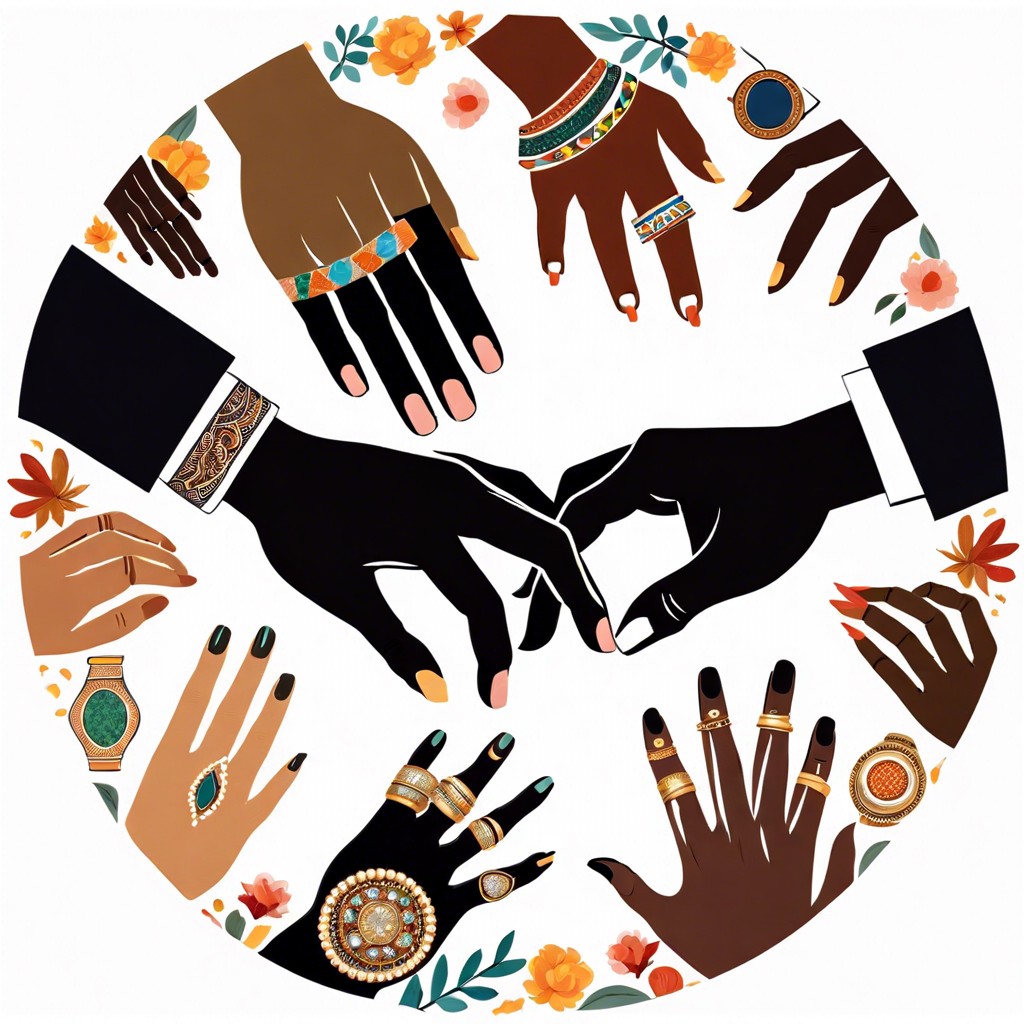This article delves into the traditional and modern practices of managing wedding expenses, guiding you through typical financial responsibilities divided between the couple, their families, and sometimes guests, to make your wedding planning significantly easier.
Key takeaways:
- Couples are shifting away from traditional payment structures
- Shared expenses and contributions based on ability are common
- Couples prioritize spending based on what’s important to them
- Communication and budgeting are key in managing wedding expenses
- Cultural differences can influence who pays for the wedding
The Traditional Allocation of Wedding Costs

Historically, the bride’s family footed the bulk of the wedding bill. They were typically responsible for the ceremony and reception costs, including the venue, catering, decorations, and photography. The groom’s side would cover the rehearsal dinner, honeymoon, and the bride’s rings.
The groom himself often paid for the marriage license, officiant’s fee, boutonnieres, and bridal bouquet. Bridesmaids and groomsmen would purchase their own attire, and guests covered their travel and accommodations.
While adhering to these customs can honor tradition, it is important to communicate openly with all parties involved to manage expectations and financial commitments effectively.
The Modern Approach Towards Wedding Expenses
In recent years, many couples have shifted away from strict adherence to traditional payment structures, opting instead to handle wedding expenses in a way that better reflects their unique financial situations. Here are a few driving concepts behind this contemporary approach:
- Shared Expenses: Couples are increasingly joining finances to cover wedding costs together, seeing it as a collaborative investment in their shared future.
- Contributions Based on Ability: Parents and family members may still contribute, but the amounts are often decided based on what each party can comfortably afford, without the pressure of fulfilling specific obligations.
- Personal Savings: It’s now common for couples to utilize personal savings or create a dedicated wedding fund they contribute to over time, which helps minimize financial strain and reliance on family.
- Prioritizing: Modern couples prioritize spending based on what’s most important to them, whether that’s splurging on a dream venue or ensuring an extensive guest list, while cutting costs on less critical items.
- Crowdfunding and Registries: Some opt for digital solutions, like wedding registries that allow guests to contribute to the wedding or honeymoon costs in lieu of traditional gifts.
Each method champions the importance of communication and budgeting; it reflects a realistic and independent take on managing the expenses associated with tying the knot.
Who Pays for What: Specifics
Understanding the breakdown of expenses can help both families navigate the financial aspect of wedding planning with clarity. Traditionally, the bride’s family takes care of the ceremony and reception costs, including venue, food, decorations, and entertainment. This might cover everything from the wedding dress and floral arrangements to the photography and transportation.
The groom’s family often pays for the rehearsal dinner, honeymoon, and sometimes the bride’s rings. They may also contribute to the costs of the marriage license and officiant fees. The groom is traditionally expected to purchase the engagement ring and pay for the wedding bands.
Bridesmaids and groomsmen typically buy their own attire, travel, and accommodations, although it’s not unusual for the couple to gift them some of these expenses, depending on their financial situation.
Couples today might choose to divide expenses differently. Many opt to share costs equally or contribute proportionally based on their individual financial statuses. It’s not uncommon for both sets of parents and the couple to pool resources, creating a collective budget.
Clear communication and setting expectations early in the wedding planning process is crucial. Determining who pays for what should be based on mutual agreement and respect for individual financial boundaries.
Cultural Differences in Wedding Expenses
Different cultures can greatly influence who traditionally foots the bill for a wedding. For example, in many parts of India, the bride’s family traditionally covers the majority of the wedding expenses. This stems from the dowry system, which historically involved the transfer of wealth alongside the bride to the groom’s family.
In contrast, American weddings traditionally followed the etiquette guide by Emily Post, where the bride’s family pays for the ceremony and reception, while the groom’s family takes care of the rehearsal dinner. Today, however, many American couples and their families split costs more evenly or pay for what they are specifically interested in or value the most.
Spanish cultures have a unique approach, often involving “padrinos” or godparents, who play a special role by contributing to specific elements of the wedding, like the cake or the bride’s dress.
Turkish weddings sometimes feature a ceremonial gold exchange called the “gold ceremony,” where guests offer gifts of gold coins to help fund the couple’s future.
In Chinese weddings, a “bride price,” similar to a reverse-dowry, is provided by the groom’s side to the bride’s parents, and the couple may also receive red envelopes filled with money from guests to help with expenses.
It’s important to recognize these customs when planning a wedding in or with different cultures, as they come with expectations which could influence budgeting and planning.
Financial Planning for a Wedding
Creating a joint wedding budget can pave the way for a collaborative and stress-free approach to your big day. Here are some key points:
- Start by identifying your total wedding budget. Consider savings, income, and any contributions from family.
- Prioritize what aspects of the wedding are most important to you and allocate funds accordingly.
- Open a dedicated wedding savings account to track expenses and savings easily.
- Look for creative ways to reduce costs, such as off-season dates or DIY decorations.
- Use budgeting apps or spreadsheets to monitor spending and stay on track.
- Be transparent and communicate regularly with all contributors to avoid any misunderstandings or financial strains.
Remember, careful financial planning can ensure that your wedding day is both memorable and affordable.
FAQ
What are the groom's parents supposed to pay for?
The groom's parents traditionally cover the rehearsal dinner, honeymoon, wedding day transportation, the officiant's expenses, and commonly the alcohol at the reception, while the groom himself is responsible for the engagement and wedding rings for the bride, along with groomsmen gifts.
Who traditionally pays for wedding?
Traditionally, the majority of the wedding-related expenses are covered by the bride's family.
Who pays for the actual wedding?
Traditionally, the wedding reception is paid for by the bride's family or both parents, however, the modern trend sees contributions from both sides, though it's not obligatory to have the whole wedding financed by the parents.
Who pays the money in a wedding?
The payment for a wedding can be handled by the bride's family, both the bride and groom's families collectively, or the couple themselves depending upon individual circumstances and traditions.
How is the expense split between bride and groom's families?
Traditionally, the bride's family covers most of the wedding costs while the groom's family pays for the rehearsal dinner, though modern couples often choose to share expenses equally or according to their ability.
How has the traditional payment method for weddings evolved in modern times?
The traditional payment method for weddings, primarily borne by the bride's family, has evolved, with modern weddings often split between the couple and both sets of parents or sometimes entirely financed by the couple themselves.
Is it appropriate for a couple to independently finance their own wedding?
Yes, it is appropriate for a couple to independently finance their own wedding.



